Sunday Reflections: How Misuse of the 40 Book Challenge Made My Kid Hate Reading and Why (& How) I Pushed Back
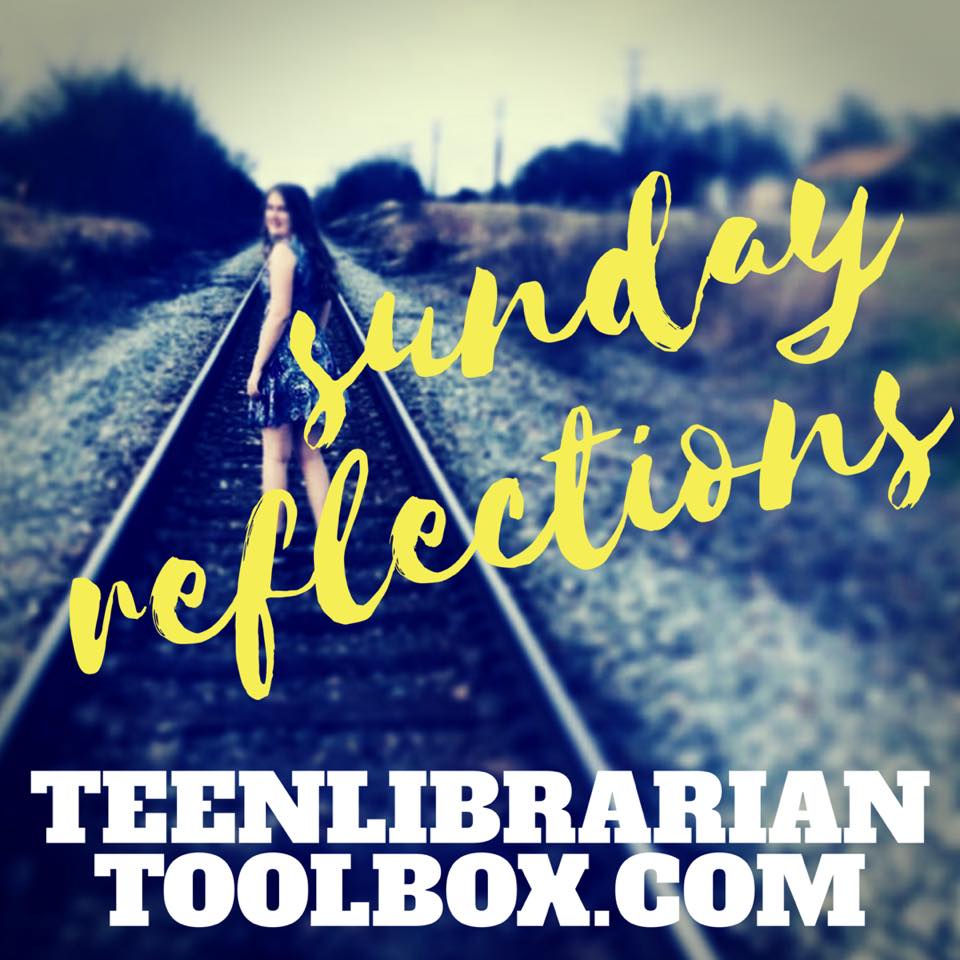
Thing 2, age 10, started the 4th grade this year. We already knew she was behind in reading as she had been diagnosed with dyslexia and given a 504 plan to provide her with accommodations. I had fought tooth and nail in the K, 1st and 2nd grade to get her diagnosed and on track, and there is a lot of push back when it comes to getting our kids accommodations because of concerns about money. We’re willing every day in many ways to sacrifice the health and well being of our children for a few dollars and serving kids with special needs is no different. You can read about our struggle to get a diagnosis and what I learned about dyslexia here. But let’s jump ahead now to the 4th grade.
So the 4th grade began and I soon learned that our kids would be participating in the 40 Book Challenge, an original concept that was made popular by Donalyn Miller but has been bastardized in many ways by school districts every where. They have taken her original intent and tried to regulate it and grade it in ways that make its original goal and premises basically moot. She has even addressed her concerns about the ways that teachers incorrectly and harmfully implement her 40 Book Challenge here.
ADVERTISEMENT
ADVERTISEMENT
In our district, kids were challenged to read 40 books. They would read 20 books the first semester and another 20 books the second semester. They had to read a very regimented list of books and were required to keep a reading log AND to fulfill a one page question sheet for each completed book to get credit. They were graded and after the first semester, when many of the kids hadn’t read the first 20 books, they had to turn in a sheet each Friday and if they didn’t their punishment was to give up their recess to walk laps. Only two of the options each semester were free choice books, everything else was designed to make them read a variety of genres. Half of the books had to be over 80 pages in length. It was a one size fits all approach that left little wiggle room for the various types and stages of readers. It was limiting, punitive, and left little room for enjoyment or exploration. And it highly regulated our children’s freedom outside of class, which is incredibly difficult because school time is now so very regulated and regimented.
This is how that first semester went in our home. As I attempted to keep my child on task to meet the various requirements and goals, we fought. A lot. My child, already behind and feeling a lot of insecurity and resenment towards reading, responded exactly as you would expect. She cried. She fought. She procrastinated. She told me she hated reading. She told me she hated me. She told me she was stupid and a failure and that she hated herself. It was a very difficult semester in our home, for everyone. But most importantly, I worried that she wasn’t going to make it out of the 4th grade with any positive emotions surrounding herself, me or reading. It felt like everyone was being harmed and damaged.
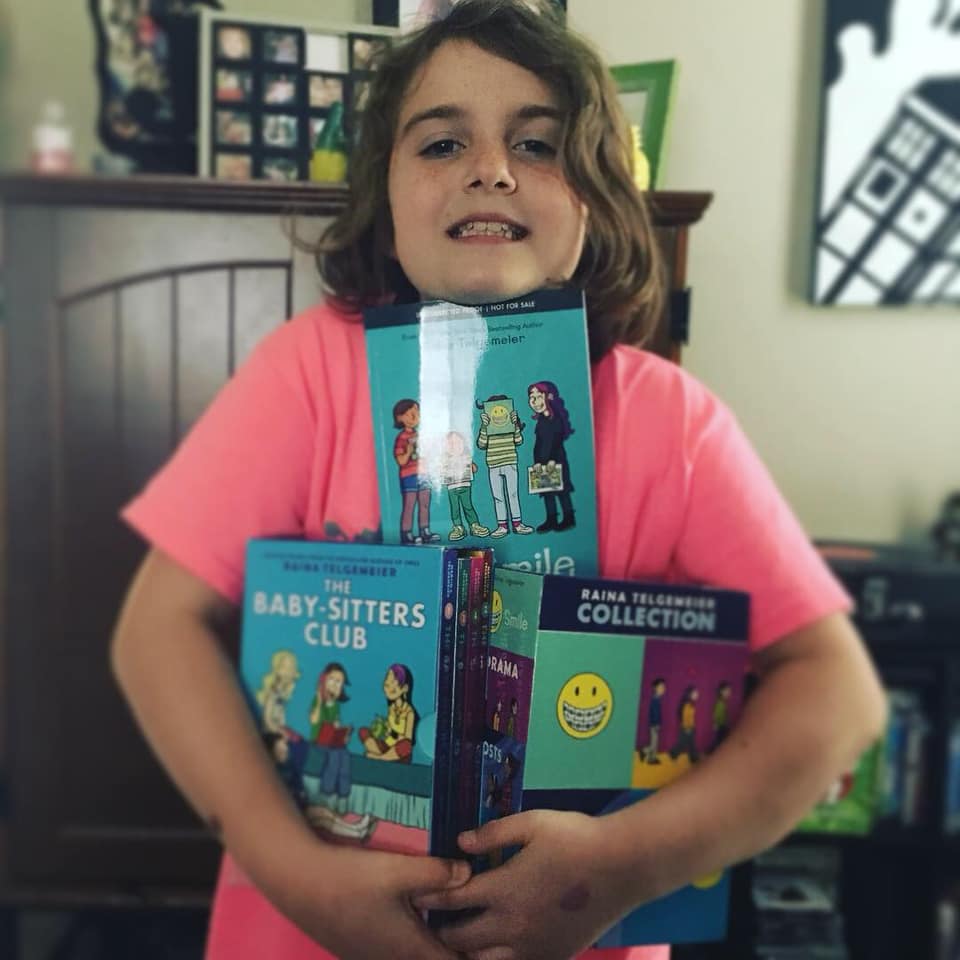
So this semester, I took a different approach and we read. We read whatever we wanted. I ignored the sheets and the genres and the assignment and we read. If Thing 2 asked for a book, I got it for her. If she tried it and she liked it, I got her more books in that series or by that author. When she asked me to buy her a book because she wanted to own it and I could afford it, we made that happen. I gave her money for the Scholastic book fair. I checked books out from my library. I took her to the half price bookstore. And we read. We read whatever she wanted, whenever she wanted. We ignored the assignment altogether and just worked on developing her personal reading skills at her own pace and on cultivating an enjoyment of reading.
When she asked me to read to her, I read to her. When she asked to read to me, I listened. I allowed her to skip a night of reading if she expressed that she wasn’t interested in reading that night. I made it my personal goal not to fight with her about reading because I recognized that a lot of things were happening in her life to give her negative associations with reading.
Over time, she started reading on her own. I can tell you based on the books she has read that she is still not reading at level. She is an insecure reader and she has to work through the fear and negative feelings before she develops confidence in her reading skills. Those fear and negative feelings are in part because she is a child with dyslexia, but also because we teach and enforce reading in ways that are negative for our children. So now we are undoing all of those things in our home.
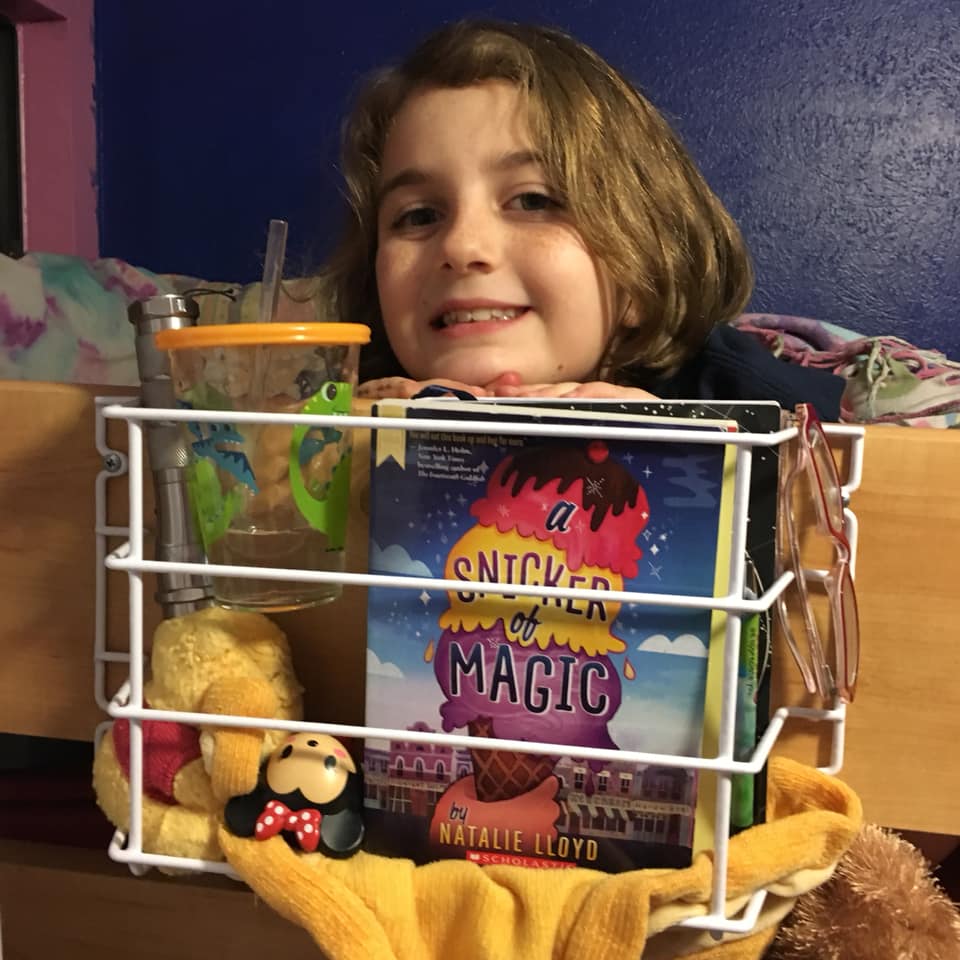
Every night now, she goes to bed with a book and a flashlight. She takes a book in the car with her. She carries a book or two in her backpack. She asks for books. She reads books. She read me a book of poetry from another room over a walkies-talkie because why not. Just this morning she came to me with a list of the books she wanted to read next and the order she wanted to read them in. She is developing joy and confidence in reading in her own way and at her own pace.
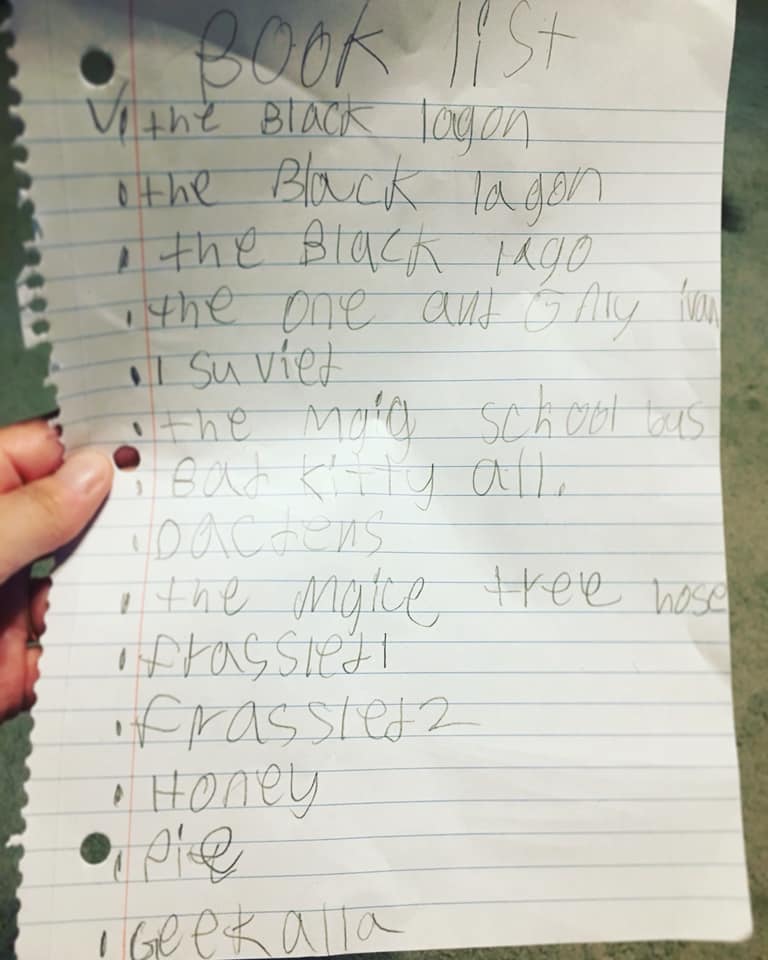
Last week, I bit the bullet and wrote her teachers a long email explaining to them that my child would not be completing the 40 Book Challenge as outlined by them. I explained to them that it is not being implemented in the ways intended and that I thought it was doing more harm than good when it comes to developing strong, confident readers. I shared with them the research I knew as a librarian about the value and importance of personal choice when it comes to children and reading, about the recent research on the decline of interest in reading around the age of 9, and about how as a mother I felt it was more important for me to nurture my child’s life long love of reading as opposed to fulfilling this one assignment because I challenged the impact and efficacy of the assignment.
It was really hard for me to write that email because I’m a rule follower who believes in and supports teachers and public education. But in my gut, I also knew it was the wrong approach for my child. I had seen it first hand. I will also admit that I made a lot of mistakes along the way. I probably should have asked for 504 accommodations immediately. I should have spoken to the teachers much sooner. I should have stopped enforcing the rules much earlier when I realized the damage that they were doing.
ADVERTISEMENT
ADVERTISEMENT
Over the course of this school year, my child has now read well over 40 books. They just aren’t the right kinds of books or the right length of books. Sometimes she read a book multiple times, and that doesn’t count either. She has read 11 of the 12 Here’s Hank books (she thought the one with a zombie would be too scary), she’s read all 8 Raina Telgemeir graphic novels, she’s read several Magic School Bus and Black Lagoon books. She’s read like 20 pictures books over and over and over again. She’s read a couple of nonfiction books about space, because she’s really into space. She has read. She has grown as a reader. She is growing more confident as a reader.
We haven’t fought about reading all semester. She hasn’t cried about reading in months. She hasn’t called herself stupid or a failure in a few weeks now. She tells me she likes reading now. I have come to realize that I made the right decision for my child.
I talked about this some several times on Twitter and Facebook and last week I shared that I was saying no to the assignment. Many people asked me about the school’s response. I would like to say that it was positive, but they basically said if she turned in what she had done to date that she would probably get a 90 and with her current grade, she would probably still pass the class. That was obviously not the response I was hoping for.
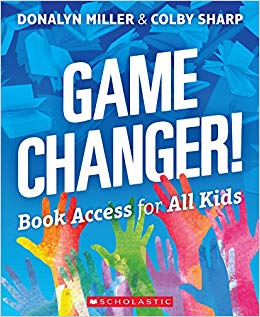
If you are a librarian or a teacher or a parent I hope that we can all learn from my horrible, miserable, no good, very bad experience with the 40 Book Challenge. Implemented in the ways intended by Donalyn Miller, I believe it is and can be a good model. I recommend even more reading and following some of her newest research in Game Changer! But whatever we do, moving forward, let’s learn from the experiences of my daughter not to take the joy out of reading. A one time grade isn’t worth the long term harm we’re doing when it comes to reading.
Filed under: Uncategorized
About Karen Jensen, MLS
Karen Jensen has been a Teen Services Librarian for almost 30 years. She created TLT in 2011 and is the co-editor of The Whole Library Handbook: Teen Services with Heather Booth (ALA Editions, 2014).
ADVERTISEMENT
ADVERTISEMENT
SLJ Blog Network
2024 Books from Pura Belpré Winners
In Memorium: The Great Étienne Delessert Passes Away
Winnie-The-Pooh | Review
Parsing Religion in Public Schools
ADVERTISEMENT



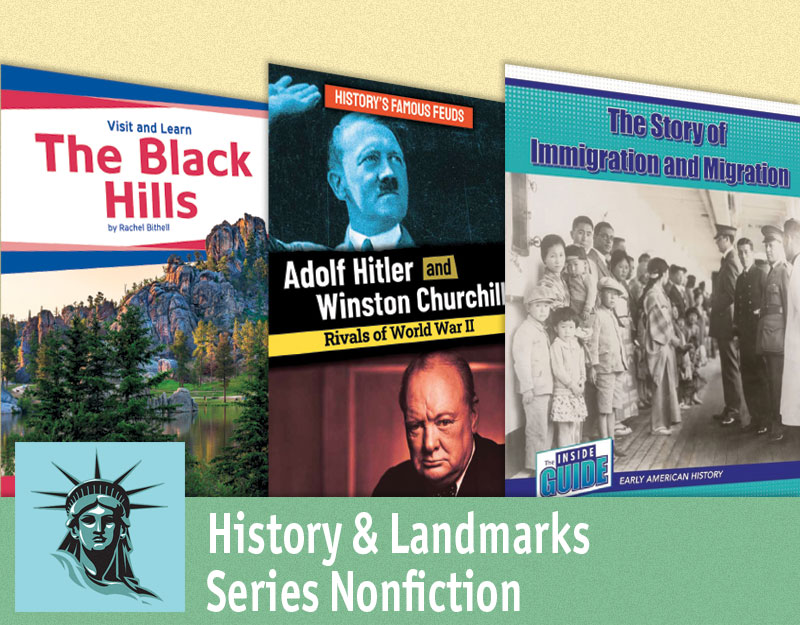

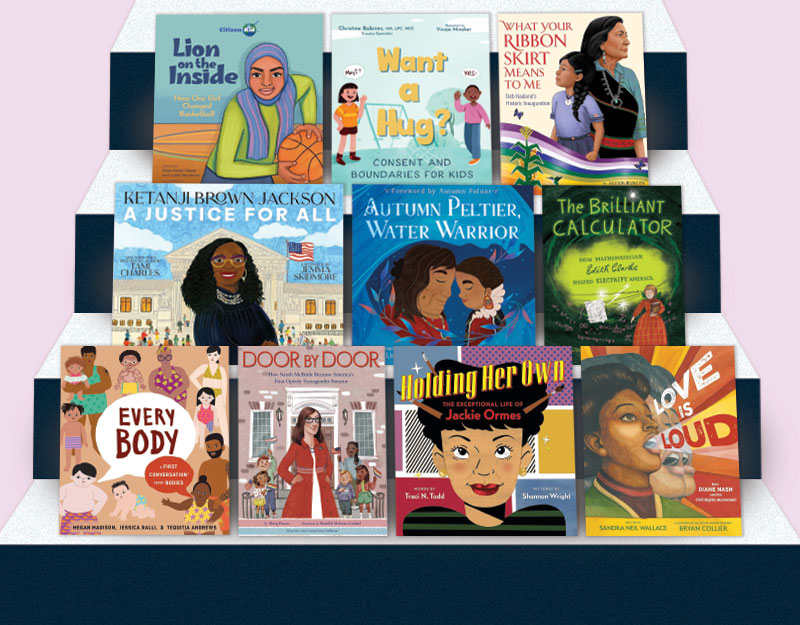
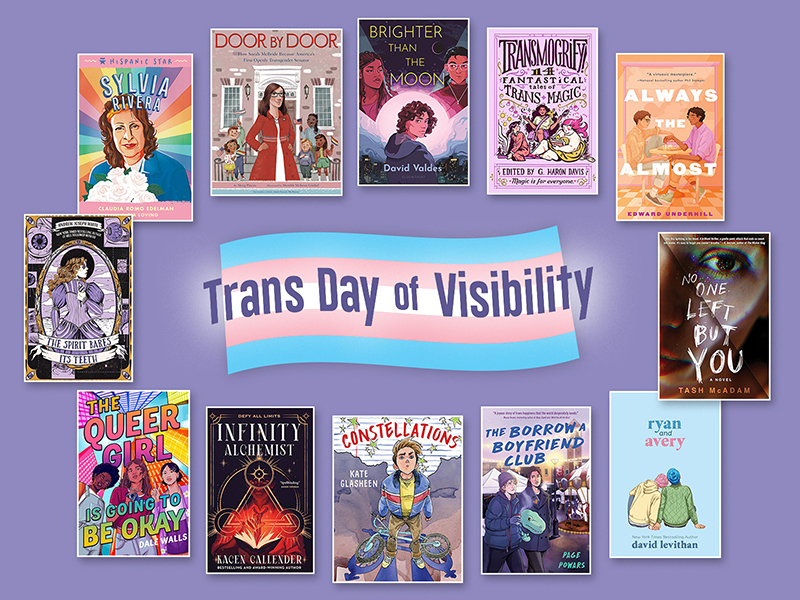
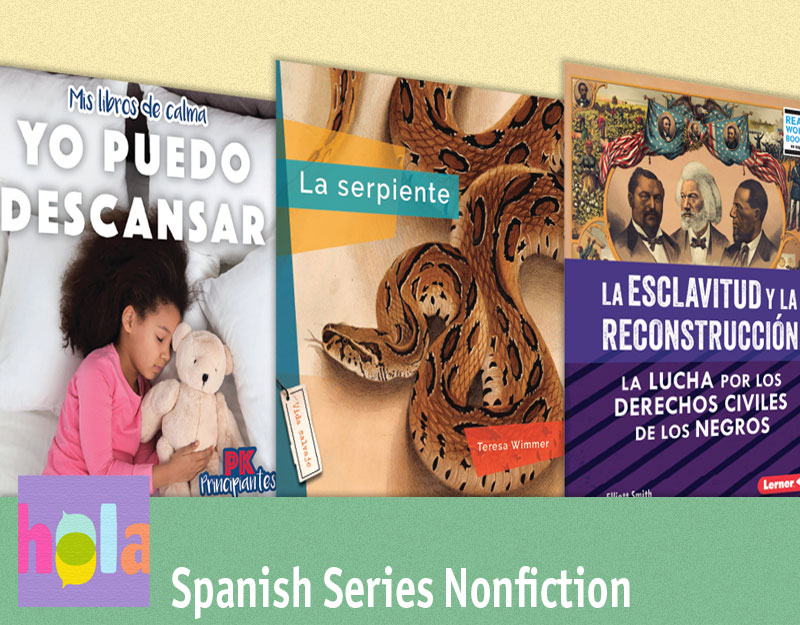
THIS!!! This is what happens to many great reading ideas! The teachers mean well, they really do. But for the life of me, I can’t figure out why they put so many restrictions on students! Reading is reading is reading!! And when you practice reading, you get better at…reading!
I agree and thank you for reading. Karen
Thank you for modeling for all of us how to advocate for kids when they are given assignments that are harmful or pointless. I’m sorry the 40 Book Challenge has been misunderstood and misused by so many teachers over the years. Makes me wonder if they read the sections on reading logs and grading reading in The Book Whisperer—the same book where the challenge is described. I’m guessing not.
Donalyn, I really really really really wanted to emphasize that this is not on you and is a complete misuse and misrepresentation of your ideas. I appreciate all the work that you do for our kids and their love of reading and am sorry that people keep doing this to your work. Karen
What in the name of all that is good in this world is WRONG with people? Why are they such control freaks that they are willfully damaging children? We should not allow people who implement such punitive nonsense to teach.
I am not a teacher, nor have I ever been one, but I think this can also be put on administrators and state standards? But I agree that there is a lot happening in our schools which are harmful to our children. Thank you so much for reading and caring about your kids. Karen
With accommodations such as a 504, being able to adjust pace and curriculum standards is completely doable and helps tremendously, as the author says. I think that until you look at where public school has had to go due to lower standards at home (in terms of importance of academics and trying your best), as well as increased scrutiny due to global competition and a”but everyone must go to college!” mindset.
There is also the fact that the overwhelmed teacher, forced to teach and evaluate such a huge number of students, cannot get feedback out and remediate as needed based on state standards and parental demands. The system is broken, but this is a multi-faceted issue that contains a large component of “we’ve always done it this way”-itis. Public school may be free, but one can expect that when there is such a stark gap between the world as it is, and the world that public institutions prepare students for, there will be great pains in the training process.
I have reached the point of dismay with reading logs, AR, and the 40 book challenge being misused. My school hammers AR to the point where the kids hate reading by third grade or only read for a test. I feel like I am fighting a loosing battle.
I am right there with you. Karen
This totally reminds me of when I was a clerk at the public library in my city. The public school district required kids to have so many AR points in a year…and it was awful to see a kid get excited about a book, only to discover that either it didn’t have enough AR points or there was no quiz at all, so they felt that they had to pick another book 🙁
I worked for a public library as well, before moving into a school librarian position. Students were constantly coming in asking where our 3.4 (or 2.7, etc.) level books could be found. It was always a long road to help them find a book they were interested in and was the “right” level. Then I moved to a school in the district whose library was organized by AR levels. That almost sent me over the edge. Tried my best to help the students find the books that they wanted to read and convince teachers to let them read.
Yes! I addressed this same issue my sons’ school (providing statistics, rationale, etc) and not one administrator or teacher responded to me. My son has dyslexia and a processing disorder. Often times the quizzes do not reflect his comprehension of a book. I have decided not to worry about AR points. If they’re reading, they’re reading. If they start reading a book they don’t enjoy, I allow them to stop and find something they do like. If they don’t get their AR points for the quarter, the sky does not fall. Thank goodness we have librarians and parents who are fighting the good fight.
AR was pushed in the small NC district where I once worked. I hated the restrictions and the demands placed on the “littles.” A school board member put me in my place, however, as to how wonderful AR was, and how it worked miracles with children. I’m guessing she used their propaganda to form her opinion.
Amen
Agreed
Amen! Wonderfully stated. I’m so sorry that you both went through so much aggravation, but very glad for the happy ending. Excellent job being an advocate for your daughter. (Been there!) I enjoyed her list and can’t wait to hear more. Read what you WANT…just read what you LOVE. ❤
Thank you so much for reading. It took me a bit to get my courageous mama bear hat on, to give myself permission to buck the system, but I have seen the results and know what I did was best for my daughter’s life long love of and ability to read. Karen
I am a 5th grade teacher and doing the 40 book challenge. I am all about choice including audio books. Well done for being a champion for your young reader. Ages and stages for all. I didn’t love reading until later in life. Celebrate!
Thank you Meggin. Karen
I have a poster that says audiobooks are not cheating
Thank you for this article! My daughter (age 10) is dyslexic. She has taught me so much about helping kids find a book they will love and can read.
It has been a sincere challenge in so many ways. And like you, I have learned a lot from my child. Thank you for reading. Karen
Thanks so much for sharing this. I wish that every teacher and parent out there could read it and internalize it. Yes, kids should read a lot of books. But it’s so much more important to protect their love of reading than to meet some arbitrary benchmarks. Your approach is the approach I’ve taken with my daughter (now in 3rd grade), and luckily I’ve had supportive teachers so far. We have a tiny bit of grief over AR, but it’s minor, and so far hasn’t affected my daughter’s love of reading. If and when it does, I intend to fight back. I’m saving your post as a reminder/encouragement. Thank you!
Thank you so much for reading and for your kind comments. I am so glad you have had supportive teachers and hope you continue to do so. Karen
Thanks for this extremely thoughtful reflection, Karen. One thing–maybe minor in the grand scheme of things–that jumps out to me is the extremely bizarre consequence for not turning in your reading sheet on time? How does walking laps during recess do anything to reinforce reading skills or habits? I read A LOT and, honestly, there are days when I would choose to go for a walk rather than sit and read; they’re both great things! Using walking as a punishment, and using it as a consequence for a reading task, seems like a quick way to ruin two good hobbies.
(I know recess-related punishments are very common, but since all of my development as a teacher has emphasized logical consequences, this still seems super weird.)
If my understanding is correct, there was a lot of problems with kids doing the first 20 books in the first semester. So the teacher wanted the kids to show her a sheet each Friday to prove that they were doing the work and if they didn’t they would have to walk laps. I find the walking of laps during kids 1 recess a day as punishment to be extremely counter productive as many kids need that free time and outlet in the course of an otherwise very regimented day. And you’re right, the punishment doesn’t fit the crime, so to speak. I asked Thing 2 last night and she said that the teacher has kind of stopped asking for the sheets, probably because it’s due in the next 2 weeks.
Punishing with exercise? Now I can see where adults general aversion to exercise might come from.
Agree! That makes no sense, with all we know about reward, punishment and motivation.
“It was a one size fits all approach that left little wiggle room for the various types and stages of readers.”
This issue is happening across the education.Developmental stages are overlooked in favor of pushing children too fast and too hard, Kudos to you for encouraging your daughter to find her love of books.
Yes, agreed. A one size fits all approach doesn’t work. And I was seeing first hand the negative effects. Once I gave myself permission to do what I knew was best, it made all the difference. But giving myself that permission was harder than I thought and took longer than I would have imagined. Thank you so much for reading. Karen
Such a great story – thank you for sharing your struggle and how you dealt with it!
One of my librarian friends forwarded this to me. I’m a reading/ELA teacher but I’m also the mom of a girl who has cerebral palsy with some visual issues and yes, she has an IEP. My girl has always loved books and loved reading. But she is at an AR school and no reading is valid if you can’t test it for her teachers. During first semester, she hadn’t found the books that moved her yet, so she read what her super reader brother read and was only partially engaged. When she took the mandatory AR quizzes, she didn’t fare well. Her teacher told me that the problem was she was reading books that were too hard and that she needed to read at a lower level. I rolled my eyes (most likely) but kept my mouth shut. Now, I wish I had said something because I think she is wrong.
We have continued to buy the audible version of whatever we buy in book form and recently her nurse got her really nice headphones. Most importantly we’ve found the niche of what she wants to read. She loves mysteries, so we did Mo and Dale and now we are doing Sammy Keyes. She loved Ban this Book and she thought the Whiz Mob and the Grenadine kid were amazing.
Her level is whatever her interests are. I should have said that then, but I didn’t want to make waves, even though I knew better. Kudos to you for being an awesome advocate.
I am dyslexic and I have no issue with public speaking just do not ask me to read to anyone but my cat. I make it my mission to try and match the kids that come in with a book that they will enjoy despite what their parent think they want (usually what they liked or “not one of those comics”) I have explained graphic novels to parents more than I care to count.
Karen – As with many different f the above responses, I want to thank you for sharing this experience. As a middle and high school English teacher who is working on integrating more independent reading into my classes, it is important to be remind of the importance of student choice.
I constantly wrestle with departmental expectations to grade students versus the knowledge that forcing kids to read independently and do artificial tasks around their reading is the best way to get kids to hate reading. Your anecdote is an excellent example of why educators at all levels, from the classroom through administration and up to boards, need to step back and ask whether assigning grades is more important than encouraging students to love reading and learning.
I have become a strong proponent of letting kids read what they want to read. Too frequently, educators who are trying to encourage student reading end up doing the opposite by trying to force parameters onto what are supposed to be “free reading” assignments. This is often coupled with either implicit or explicit judgments about book types, genres, lengths, reading levels, etc. This seems to be a pervasive problem. To try to bring some attention to it, I wrote a post for AASL’s Knowledge Quest blog about this very topic – “Stop Literacy Shaming! Engaging the so-called ‘non-readers'” (https://knowledgequest.aasl.org/stop-literacy-shaming-engaging-the-so-called-non-readers/). Your daughter’s situation perfectly illustrates the damage done when artificial constraints are applied to what should be an anjoyable activity, usually for the sake of being able to justify “just” having kids read. But having kids read is probably the single most important learning activity they can do!
Sorry to have rambled on, but thank you again for sharing this experience!
Well said! I look forward to reading your blog.
People commenting must not be in the position of showing growth in their students. It’s all very well and good to sit on the high horse and preach from above but when you are a teacher whose job might depend on the growth of students of and the need to measure that you might be singing a different tune
Howdy, Anon – Without a doubt, there is pressure on teachers to show measurable reading growth, which encourages practices that are not in the best interests of students. It’s a shame, since educators know this is not a good way to encourage a love of reading; and yet, too often, it’s those outside the classroom and with little or no training in education who set the requirements that make teachers feel forced into doing things that are not going to foster a love of learning in our students. As one of my first principals liked to say, “You don’t make a pig fatter by weighing it.” And yet, teachers are encouraged, even required, to continue weighing and weighing, and are pressured to get that weight up. I suppose I’m building to a factory-farm versus heirloom farm analogy here, where kids are being force-fed to get them to market quickly and cheaply, which tends to harm their development, rather than letting them graze and find the things that give them their own unique flavors. (OK, this analogy has taken a worrying turn…)
Suffice it to say that, yes, we are talking about ideal reading conditions, conditions which are not often present in schools. But they could be if we had enough people who “got it”. Personally, I think we’re long past due for amplifying stories like this one – maybe we can finally get some quality changes to education happening.
Bravo to you! My middle school implemented a similar program based on a nationally recognized professional development organization. The leaders of this program wanted to improve literacy in our school but I’m afraid they nurtured a stronger dislike of reading.
Students need choice, and there is NO one size fits all approach. I wish more parents were like you and pushed back when schools implement truly harmful initiatives like the one you described.
PS
My district encourages teachers to read Donalyn Miller and Penny Kittle but then entirely dismiss their methodology. Go figure!
I, too, am a teacher who wants to promote a love of reading. Luckily for me though, I don’t need to track anything related to this, so I let my students read every single day for 20 minutes.
Every. Day.
It doesn’t take long for them to figure out what they want to read. If they are choosing easy books that I know aren’t at their level, I let them, but only for a day or two. Then I tell them that they can use that book as a ‘brain break’ if they want, but should also have something more challenging on the go.
I also conference with them so they can tell me what they’re reading, why they chose it, what the best/worst part is, whether I should read it. If I’ve read it, I share my ideas. If I haven’t, I often do afterwards so they know I take them seriously.
It never fails, as each year my whole class learns the value of reading. Not to say they are all going to read each day by choice, but comprehension definitely improves across the board with that much practice.
I’m sorry to hear of systems that choke the teacher with the need for data and proof, and take away the joy of learning.
This is a very upsetting post. At the elementary school level at the very least, it should not be hard for teachers, working with parents of students with special needs and IEPs, to adjust classroom programs to work together to meet the needs of those students. No one knows the student better than the parent does. I hope that in the future everyone involved in this student’s life can help her to rekindle the love for books that will make her life in the future in the future immeasurably more reward. I also hope that that the teacher, school librarian if available, and an administrator can meet to debrief and learn from this experience, because statistics make it clear that it is bound to recur.
Too many great ideas are destroyed by school districts as they attempt over and over to find a magic one- size fits all needs program. Thank you for sharing the importance of free choice in reading materials. My third graders know that there will be times they are asked to read specific books, genres, but they also get lots of encouragement to find what they like for their independent reading. My classroom library is chock full of choice. Every genre, including the comics and graphic novels I love, at many different reading levels — BUT without actual printed levels despite the district’s of F & P. I also want to cheer for your approach to making reading accessible and fun! Poetry over walkie talkies? Genius! Since when did repetative reading of a text become something that “doesn’t count?”
Have you also tapped into the world of audio? There are so many resources for kids from A to Z Reading online, to podcasts and books on audible. They can be a fantastic way to experience the rich language and more complex plots of books just above her reading ability.
When it all said and done, you are the one making the most enduring connection by spending time together. Keep the faith! I didn’t get hooked until after 7th grade.
This is so sad and, as many have pointed out, completely against the spirit of Donalyn’s original idea. I understand that we want students to have variety in their reading choices, but what so many fail to understand is that the more time and choice we give students, the more they’ll read and the more variety they’ll have in what they read. Students don’t need rules to encourage all of this. There are no requirements in my 7th grade reading workshop in terms of genres or number of books finished, but at the end of each quarter students set goals, with some guidance from me as needed, about their book choices, and as the year goes on they each try an incredible variety of books. The idea of an even split of 20 books each semester is also a problem (although maybe not as significant as many of the others). This year, it looks like my 7th graders will read an average of over 40 books a kid. At the end of 1st semester, we were averaging about 15 books a kid, meaning 2nd semester it will be about 25 a kid. The reason is that all the students who have never read much before need time to figure out what they like, and when they do, the volume in reading for many of them takes off. I had one girl who only finished 1 book 1st quarter and 4 during 2nd quarter. However, she finished 11 during 3rd quarter. Over a fourth of my students finished as many or more books during 3rd quarter than they did the whole 1st semester. This growth should be celebrated, not punished because they didn’t meet an arbitrary number.
Thank you for writing about how you handled all of this. I have two young girls, the oldest in preschool. I’ve often wondered what I’m going to do if they are ever in situations like this, so I appreciate being able to see what you did.
Hi, I have come late to this post. I am a Teacher Librarian in Australia. I am in NSW, but other states also run similar “Challenges” to ours: We have a state-wide reading challenge, The ‘Premier’s Reading Challenge’ (‘PRC’), at several different grade levels. Students read 20 books, which can be picture books (many of which have sophisticated content but are accessible, or even wordless), various types of “Chapter Books” and novels, and even graphic novels – two of Raina Telgemeir’s are on the Grades 5-6 level (for 10 to 12 year-olds). Students can also have 5 “free-choice” titles which are not on the list of thousands of books. After completing the ‘PRC’, my students set up their own ‘Independent Reading Challenge’ which can be almost anything – student choice of any genre at a suitable level. They are becoming, and identifying as, independent readers. Younger students (Kindy to Year 2) listen to 30 stories read by an adult. Records are submitted online and awards received at the end of the year. Schools can also give an in-school award if the delayed award is a concern.
https://online.det.nsw.edu.au/prc/booklist/home.html
I had an experience with “book reports” in the late 80’s. My daughter was an avid reader (for a nine year old) but HATED book reports. As an educator I too wanted to “follow the rules”…”every book you read you must hand in a book report ” She did one. I, of course, was called in for conference but I told the teacher she would have to take the lower grade……..she was NINE, it wasn’t the end of the world. She continued as an avid reader and now runs a huge non-profit teaching philanthropy through the arts to children and young adults…….SNAP!
Great job finding a solution…I hope going forward your daughter has a better experience. ❤️
For anyone dealing with some sort of highly structured program like this in the school—skip the teacher, counselor, and school reading specialist. Head right to the district level reading coordinators and complain loudly. Frequently. Get your friends to as well. Your child’s teacher is most likely a rule follower like yourself. Teachers tend to be. She has sat in district level trainings with that district coordinator for professional development and been told about this slick new program they are (forcing) implementing district wide and all of the rigid rules that go along with it. I remember how they did this to me with the science fair at the middle school level. We HAD to make every kid do it even when a lot of our kids could have learned experimental design in class with different prompts much better. Not every kid needs the “rigor” of personal research in science. They just don’t—even if I myself love it. It was a disaster for some of the kids, and we still had to defend it with the stuff we heard at those trainings. I’m so happy for my years as a teacher because now that my children are in school it’s easier to be KIND and know just how much is out of her control and why. Most of it is knowing who to talk to to see things get done.
You might as well have been talking about my son. The reading challenges he got in 3rd grade were very different from yours- he chose the books and the amount to be read each day. And was given time-off between books. But reading is a chore for him. Even though he enjoyes being read to very much.
Am going to try your way next🥳
So sorry for your struggles. I feel grateful that I raised my three in the 1990’s and early 2000’s before the massive focus on testing. Our teachers were designed thematic units, teaching multi age classrooms and faithfully following Howard Gardner’s multiple intelligence research.
We were know in the US for producing creative thinkers. Unfortunately, we are drumming creativity out of our children as our teaching methods become two dimensional and didactic.
Wow as a teacher this makes me so sad.. I have to fight some of my parents TO read for fun, and read what their kids like. Parents every year ask me for more homework because I give very little (required to, so I make it short), and they have been trained to think HW is helping their kid. It’s not. I tell them up front I don’t grade it or look at it, and if they never turn it in is fine by me as long as they are reading at home. Reading is what makes readers. But so many won’t take the time to do what you are doing.